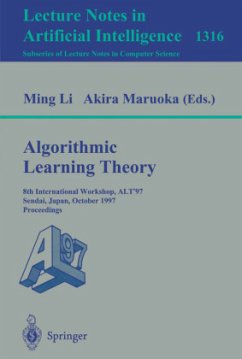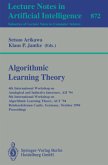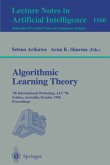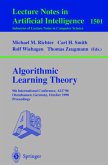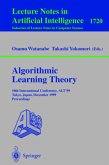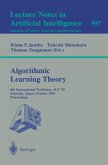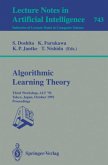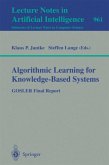Li8th International Workshop, ALT '97, Sendai, Japan, October 6-8, 1997. Proceedings
Algorithmic Learning Theory
8th International Workshop, ALT '97, Sendai, Japan, October 6-8, 1997. Proceedings
Mitarbeit:Li, Ming; Maruoka, Akira
Li8th International Workshop, ALT '97, Sendai, Japan, October 6-8, 1997. Proceedings
Algorithmic Learning Theory
8th International Workshop, ALT '97, Sendai, Japan, October 6-8, 1997. Proceedings
Mitarbeit:Li, Ming; Maruoka, Akira
- Broschiertes Buch
- Merkliste
- Auf die Merkliste
- Bewerten Bewerten
- Teilen
- Produkt teilen
- Produkterinnerung
- Produkterinnerung
The volume presents 26 revised full papers selected from 42 submissions. Also included are three invited papers by leading researchers. Among the topics addressed are PAC learning, learning algorithms, inductive learning, inductive inference, learning from examples, game-theoretical aspects, decision procedures, language learning, neural algorithms, and various other aspects of computational learning theory.
Andere Kunden interessierten sich auch für
![Algorithmic Learning Theory Algorithmic Learning Theory]() Setsuo Arikawa / Klaus P. Jantke (eds.)Algorithmic Learning Theory39,99 €
Setsuo Arikawa / Klaus P. Jantke (eds.)Algorithmic Learning Theory39,99 €![Algorithmic Learning Theory Algorithmic Learning Theory]() Setsuo Arikawa / Arun K. Sharma (eds.)Algorithmic Learning Theory39,99 €
Setsuo Arikawa / Arun K. Sharma (eds.)Algorithmic Learning Theory39,99 €![Algorithmic Learning Theory Algorithmic Learning Theory]() RichterAlgorithmic Learning Theory39,99 €
RichterAlgorithmic Learning Theory39,99 €![Algorithmic Learning Theory Algorithmic Learning Theory]() Osamu Watanabe / Takashi Yokomori (eds.)Algorithmic Learning Theory39,99 €
Osamu Watanabe / Takashi Yokomori (eds.)Algorithmic Learning Theory39,99 €![Algorithmic Learning Theory Algorithmic Learning Theory]() Klaus P. Jantke / Takeshi Shinohara / Thomas Zeugmann (eds.)Algorithmic Learning Theory39,99 €
Klaus P. Jantke / Takeshi Shinohara / Thomas Zeugmann (eds.)Algorithmic Learning Theory39,99 €![Algorithmic Learning Theory - ALT '92 Algorithmic Learning Theory - ALT '92]() Shuji Doshita / Koichi Furukawa / Klaus P. Jantke / Toyaki Nishida (eds.)Algorithmic Learning Theory - ALT '9239,99 €
Shuji Doshita / Koichi Furukawa / Klaus P. Jantke / Toyaki Nishida (eds.)Algorithmic Learning Theory - ALT '9239,99 €![Algorithmic Learning for Knowledge-Based Systems Algorithmic Learning for Knowledge-Based Systems]() Algorithmic Learning for Knowledge-Based Systems39,99 €
Algorithmic Learning for Knowledge-Based Systems39,99 €-
-
-
The volume presents 26 revised full papers selected from 42 submissions. Also included are three invited papers by leading researchers. Among the topics addressed are PAC learning, learning algorithms, inductive learning, inductive inference, learning from examples, game-theoretical aspects, decision procedures, language learning, neural algorithms, and various other aspects of computational learning theory.
Hinweis: Dieser Artikel kann nur an eine deutsche Lieferadresse ausgeliefert werden.
Hinweis: Dieser Artikel kann nur an eine deutsche Lieferadresse ausgeliefert werden.
Produktdetails
- Produktdetails
- Lecture Notes in Computer Science 1316
- Verlag: Springer / Springer Berlin Heidelberg / Springer, Berlin
- Artikelnr. des Verlages: 10545816, 978-3-540-63577-2
- 1997.
- Seitenzahl: 484
- Erscheinungstermin: 17. September 1997
- Englisch
- Abmessung: 235mm x 155mm x 27mm
- Gewicht: 616g
- ISBN-13: 9783540635772
- ISBN-10: 3540635777
- Artikelnr.: 09245428
- Herstellerkennzeichnung
- Springer-Verlag GmbH
- Tiergartenstr. 17
- 69121 Heidelberg
- ProductSafety@springernature.com
- Lecture Notes in Computer Science 1316
- Verlag: Springer / Springer Berlin Heidelberg / Springer, Berlin
- Artikelnr. des Verlages: 10545816, 978-3-540-63577-2
- 1997.
- Seitenzahl: 484
- Erscheinungstermin: 17. September 1997
- Englisch
- Abmessung: 235mm x 155mm x 27mm
- Gewicht: 616g
- ISBN-13: 9783540635772
- ISBN-10: 3540635777
- Artikelnr.: 09245428
- Herstellerkennzeichnung
- Springer-Verlag GmbH
- Tiergartenstr. 17
- 69121 Heidelberg
- ProductSafety@springernature.com
Program error detection/correction: Turning PAC learning into Perfect learning.- Team learning as a game.- Inferability of recursive real-valued functions.- Learning of R.E. Languages from good examples.- Identifiability of subspaces and homomorphic images of zero-reversible languages.- On exploiting knowledge and concept use in learning theory.- Partial occam's razor and its applications.- Derandomized learning of boolean functions.- Learning DFA from simple examples.- PAC learning under helpful distributions.- PAC learning using Nadaraya-Watson estimator based on orthonormal systems.- Monotone extensions of boolean data sets.- Classical Brouwer-Heyting-Kolmogorov interpretation.- Inferring a system from examples with time passage.- Polynomial time inductive inference of regular term tree languages from positive data.- Synthesizing noise-tolerant language learners.- Effects of Kolmogorov complexity present in inductive inference as well.- Learning one-variable pattern languages very efficiently on average, in parallel, and by asking queries.- Oracles in ? 2 p are sufficient for exact learning.- Exact learning via teaching assistants (Extended abstract).- An efficient exact learning algorithm for ordered binary decision diagrams.- Probability theory for the Brier game.- Learning and revising theories in noisy domains.- A note on a scale-sensitive dimension of linear bounded functionals in Banach Spaces.- On the relevance of time in neural computation and learning.- A simple algorithm for predicting nearly as well as the best pruning labeled with the best prediction values of a decision tree.- Learning disjunctions of features.- Learning simple deterministic finite-memory automata.- Learning acyclic first-order horn sentences from entailment.- On learning disjunctionsof zero-one threshold functions with queries.
Program error detection/correction: Turning PAC learning into Perfect learning.- Team learning as a game.- Inferability of recursive real-valued functions.- Learning of R.E. Languages from good examples.- Identifiability of subspaces and homomorphic images of zero-reversible languages.- On exploiting knowledge and concept use in learning theory.- Partial occam's razor and its applications.- Derandomized learning of boolean functions.- Learning DFA from simple examples.- PAC learning under helpful distributions.- PAC learning using Nadaraya-Watson estimator based on orthonormal systems.- Monotone extensions of boolean data sets.- Classical Brouwer-Heyting-Kolmogorov interpretation.- Inferring a system from examples with time passage.- Polynomial time inductive inference of regular term tree languages from positive data.- Synthesizing noise-tolerant language learners.- Effects of Kolmogorov complexity present in inductive inference as well.- Learning one-variable pattern languages very efficiently on average, in parallel, and by asking queries.- Oracles in ? 2 p are sufficient for exact learning.- Exact learning via teaching assistants (Extended abstract).- An efficient exact learning algorithm for ordered binary decision diagrams.- Probability theory for the Brier game.- Learning and revising theories in noisy domains.- A note on a scale-sensitive dimension of linear bounded functionals in Banach Spaces.- On the relevance of time in neural computation and learning.- A simple algorithm for predicting nearly as well as the best pruning labeled with the best prediction values of a decision tree.- Learning disjunctions of features.- Learning simple deterministic finite-memory automata.- Learning acyclic first-order horn sentences from entailment.- On learning disjunctionsof zero-one threshold functions with queries.

